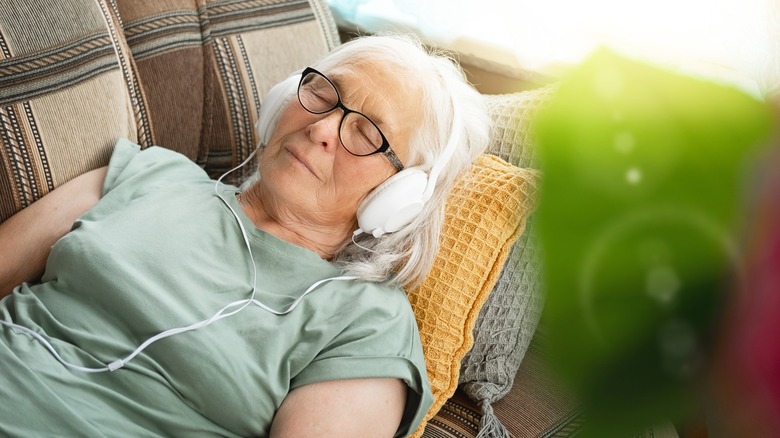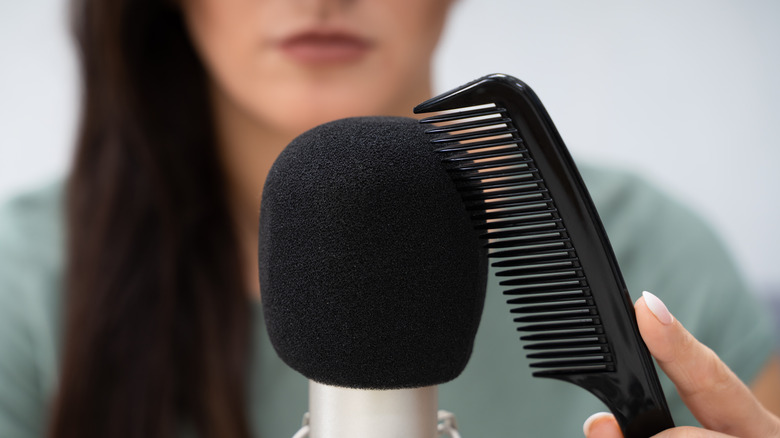What Happens To Your Brain When You Experience ASMR
The human body can have some pretty magical responses to the environment around us, including sights, smells, sounds, and more. ASMR is one such response that some people report feeling when prompted by certain stimuli. ASMR, or autonomous sensory meridian response, is characterized by a pleasant, calming tingling sensation that usually begins in the scalp and may resonate down the body, reports Healthline.
The sensation is most often evoked in response to specific sights, sounds, or styles of touch, according to Healthline. Generally speaking, these triggers are of the relaxing variety, such as whispering, scratching, tapping, or close personal attention. Simply Psychology notes that other possible ASMR triggers may include hair brushing, massage, or water sounds, as opposed to jarring or disruptive stimuli such as the whirring of a vacuum or a loud bang. To induce ASMR sensations, some people seek out online videos depicting these auditory or visual triggers. So it begs the question, what exactly is going on inside the brain when that tingling sensation strikes?
The relationship between ASMR and anxiety
While the evidence is limited, Healthline notes that some research shows brain activation occurs in regions associated with emotion regulation, empathy, and socialization when one experiences ASMR. An alternate theory is that during ASMR, the brain produces various neurohormones, some of which may be related to feelings of comfort, sleepiness, and relaxation. Subsequently, it's possible that ASMR may help promote sleep, concentration, mood, and more.
However, a 2022 study published in PLOS ONE suggests that the emotional benefits of ASMR may only predominantly affect people possessing specific traits. Researchers had 64 participants watch an ASMR video, 36 of which had previously experienced ASMR, and 28 people who had never experienced the sensation. Participants also underwent testing to evaluate levels of neuroticism and trait anxiety. Participants' state anxiety was also assessed before and after viewing the video.
The study findings revealed that ASMR-experiencers ranked higher for neuroticism and trait anxiety than those who had not experienced ASMR. ASMR-experiencers were also found to be more anxious before watching the video and less anxious after the viewing, while the non-ASMR group's levels of anxiety remained unchanged. The study suggests that ASMR may be effective in reducing anxiety, but only in those who experience anxiety to begin with.
ASMR may have lingering effects
As it turns out, our brains may not only experience a response to ASMR when stimulated. Rather, a 2022 study published in Cortex suggests that ASMR's effects on the brain appear to linger after the fact.
Researchers logged the brain wave activity of 26 adults before, during, and after watching a 10-minute ASMR video of their personal preference, according to a Goldsmiths, University of London press release. The video was to be watched twice, once as is, and again after the contents of the video had been divided up and rearranged in a different order. Participants were to push buttons as they watched the video that corresponded with their current physical state and sensations experienced.
The study findings showed that the ASMR videos reduced high-frequency brain waves and amplified low-frequency brain waves in participants, regardless of whether they watched the original video or the disjointed video, as per the press release. More specifically, researchers found that the observed increase in alpha brain waves amongst participants lasted for as long as 45 minutes following ASMR exposure, indicating a prolonged state of relaxation experienced that slowly tapered off within the hour. The phenomenon was described by researchers as an "afterglow effect."
Could ASMR be used as a therapeutic intervention?
With the growing popularity of ASMR videos across YouTube and scientific evidence starting to emerge in support of its potential benefits, is it possible that ASMR could be on its way to one day being used as a therapeutic tool?
While there isn't enough research to back up ASMR as a viable method of mental health treatment, some experts say it may hold potential as a coping mechanism. "While we should be concerned about extrapolating beyond the data, I do appreciate from a lay perspective how these videos can be a soothing option and help people on their mental health journeys," says Lily Brown, an assistant professor of Psychology in Psychiatry at the Center for the Treatment and Study of Anxiety at Penn, via Penn Medicine News. Rather, Brown suggests that ASMR could potentially be an effective tool for emotion regulation.
Although still a long way off, the idea of using ASMR in healthcare settings at some point in the future may not be entirely out of the question. While more study is needed, Dr. Giulia Poerio, a researcher at the University of Essex, tells MobiHealthNews that with training, ASMR may hold promise as a potential therapeutic intervention within the healthcare community.




